新概念二第1课 课文及答案
新概念英语第二册课后习题答案详解和单元测试答案(全)
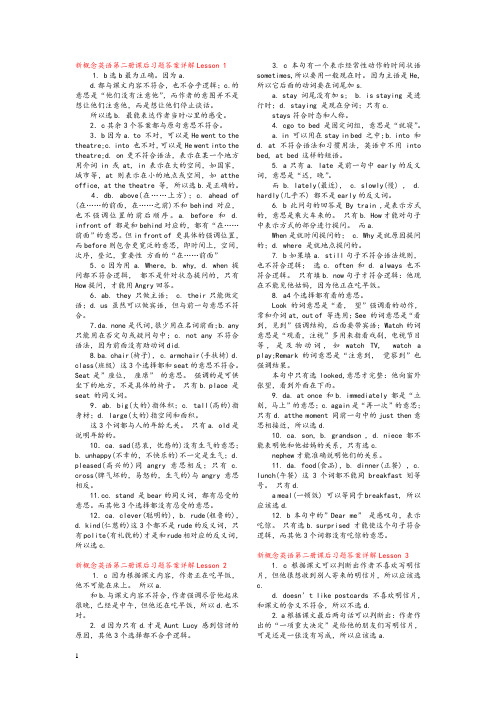
新概念英语第二册课后习题答案详解Lesson 11. b选b最为正确。
因为a.d.都与课文内容不符合,也不合乎逻辑;c.的意思是“他们没有注意他”,而作者的意图并不是想让他们注意他,而是想让他们停止谈话。
所以选b. 最能表达作者当时心里的感受。
2.c其余3个答案都与原句意思不符合。
3.b因为a. to 不对,可以是He went to the theatre;c. into 也不对,可以是He went into the theatre;d. on更不符合语法,表示在某一个地方用介词in 或at, in 表示在大的空间,如国家,城市等,at 则表示在小的地点或空间,如atthe office, at the theatre 等, 所以选b.是正确的。
4.db. above(在……上方);c. ahead of (在……的前面,在……之前)不和behind 对应,也不强调位置的前后顺序。
a. before 和 d. infront of 都是和behind对应的,都有“在……前面”的意思。
但in front of 更具体的强调位置,而before则包含更宽泛的意思,即时间上,空间,次序,登记,重要性方面的“在……前面”5.c因为用 a. Where, b. why, d. when 提问都不符合逻辑,都不是针对状态提问的,只有How提问,才能用Angry回答。
6.ab. they 只做主语; c. their只能做定语;d. us 虽然可以做宾语,但与前一句意思不符合。
7.da. none是代词,很少用在名词前面;b. any 只能用在否定句或疑问句中;c. not any 不符合语法,因为前面没有助动词did.8.ba. chair(椅子), c. armchair(手扶椅) d. class(班级) 这3个选择都和seat的意思不符合。
Seat是”座位,座席”的意思。
强调的是可供坐下的地方,不是具体的椅子。
新概念第二册课文
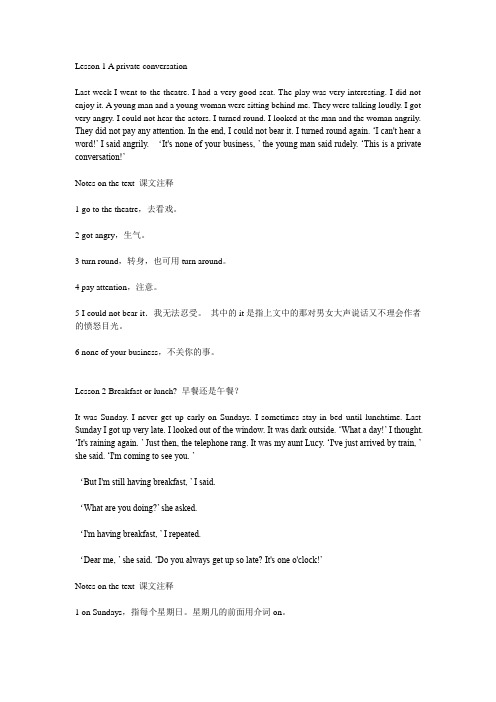
Lesson 1 A private conversationLast week I went to the theatre. I had a very good seat. The play was very interesting. I did not enjoy it. A young man and a young woman were sitting behind me. They were talking loudly. I got very angry. I could not hear the actors. I turned round. I looked at the man and the woman angrily. They did not pay any attention. In the end, I could not bear it. I turned round again. ‘I can't hear a word!’ I said angrily. ‘It's none of your business, ’ the young man said rudely. ‘This is a private conversation!’Notes on the text 课文注释1 go to the theatre,去看戏。
2 got angry,生气。
3 turn round,转身,也可用turn around。
4 pay attention,注意。
5 I could not bear it.我无法忍受。
其中的it是指上文中的那对男女大声说话又不理会作者的愤怒目光。
6 none of your business,不关你的事。
Lesson 2 Breakfast or lunch? 早餐还是午餐?It was Sunday. I never get up early on Sundays. I sometimes stay in bed until lunchtime. Last Sunday I got up very late. I looked out of the window. It was dark outside. ‘What a day!’ I thought. ‘It's raining again.’ Just then, the telephone rang. It was my aunt Lucy. ‘I've just arrived by train, ’ she said. ‘I'm coming to see you. ’‘But I'm still having breakfast, ’ I said.‘What are you doing?’ she asked.‘I'm having breakfast, ’ I repeated.‘Dear me, ’ she said. ‘Do you always get up so late? It's one o'clock!’Notes on the text 课文注释1 on Sundays,指每个星期日。
新概念英语第二册课后练习题答案详解(第1课)
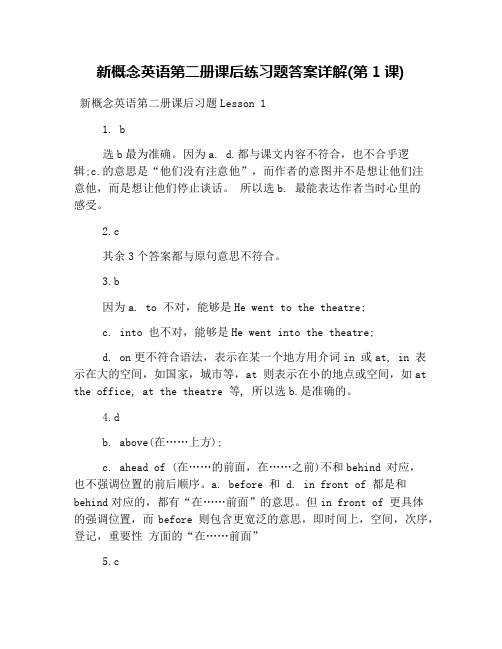
新概念英语第二册课后练习题答案详解(第1课)新概念英语第二册课后习题Lesson 11. b选b最为准确。
因为a. d.都与课文内容不符合,也不合乎逻辑;c.的意思是“他们没有注意他”,而作者的意图并不是想让他们注意他,而是想让他们停止谈话。
所以选b. 最能表达作者当时心里的感受。
2.c其余3个答案都与原句意思不符合。
3.b因为a. to 不对,能够是He went to the theatre;c. into 也不对,能够是He went into the theatre;d. on更不符合语法,表示在某一个地方用介词in 或at, in 表示在大的空间,如国家,城市等,at 则表示在小的地点或空间,如at the office, at the theatre 等, 所以选b.是准确的。
4.db. above(在……上方);c. ahead of (在……的前面,在……之前)不和behind 对应,也不强调位置的前后顺序。
a. before 和 d. in front of 都是和behind对应的,都有“在……前面”的意思。
但in front of 更具体的强调位置,而before 则包含更宽泛的意思,即时间上,空间,次序,登记,重要性方面的“在……前面”5.c因为用 a. Where, b. why, d. when 提问都不符合逻辑,都不是针对状态提问的,只有How提问,才能用Angry回答。
6.ab. they 只做主语;c. their只能做定语;d. us 虽然能够做宾语,但与前一句意思不符合。
7.da. none是代词,很少用在名词前面;b. any 只能用在否定句或疑问句中;c. not any 不符合语法,因为前面没有助动词did.8.ba. chair(椅子), c. armchair(手扶椅) d. class(班级) 这3个选择都和seat的意思不符合。
Seat 是”座位,座席” 的意思。
新概念英语第二册第1课课文详解及语法解析
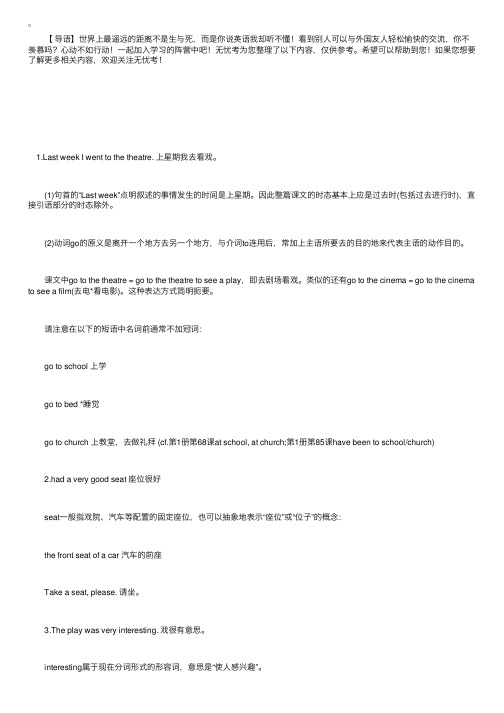
【导语】世界上最遥远的距离不是⽣与死,⽽是你说英语我却听不懂!看到别⼈可以与外国友⼈轻松愉快的交流,你不羡慕吗?⼼动不如⾏动!⼀起加⼊学习的阵营中吧!⽆忧考为您整理了以下内容,仅供参考。
希望可以帮助到您!如果您想要了解更多相关内容,欢迎关注⽆忧考! st week I went to the theatre. 上星期我去看戏。
(1)句⾸的“Last week”点明叙述的事情发⽣的时间是上星期。
因此整篇课⽂的时态基本上应是过去时(包括过去进⾏时),直接引语部分的时态除外。
(2)动词go的原义是离开⼀个地⽅去另⼀个地⽅,与介词to连⽤后,常加上主语所要去的⽬的地来代表主语的动作⽬的。
课⽂中go to the theatre = go to the theatre to see a play,即去剧场看戏。
类似的还有go to the cinema = go to the cinema to see a film(去电*看电影)。
这种表达⽅式简明扼要。
请注意在以下的短语中名词前通常不加冠词: go to school 上学 go to bed *睡觉 go to church 上教堂,去做礼拜 (cf.第1册第68课at school, at church;第1册第85课have been to school/church) 2.had a very good seat 座位很好 seat⼀般指戏院、汽车等配置的固定座位,也可以抽象地表⽰“座位”或“位⼦”的概念: the front seat of a car 汽车的前座 Take a seat, please. 请坐。
3.The play was very interesting. 戏很有意思。
interesting属于现在分词形式的形容词,意思是“使⼈感兴趣”。
它通常与⾮⼈称主语连⽤或修饰某个事物: This is an interesting book/idea. 这是⼀本有趣的书/⼀个令⼈感兴趣的主意。
新概念英语第二册课后习题答案详解_1-40

新概念英语第二册课后习题答案详解Lesson 11. b选b最为正确。
因为a.d.都与课文内容不符合,也不合乎逻辑;c.的意思是“他们没有注意他”,而作者的意图并不是想让他们注意他,而是想让他们停止谈话。
所以选b. 最能表达作者当时心里的感受。
2.c其余3个答案都与原句意思不符合。
3.b因为a. to 不对,可以是He went to the theatre;c. into 也不对,可以是He went into the theatre;d. on更不符合语法,表示在某一个地方用介词in 或at, in 表示在大的空间,如国家,城市等,at 则表示在小的地点或空间,如atthe office, at the theatre 等, 所以选b.是正确的。
4.db. above(在……上方);c. ahead of (在……的前面,在……之前)不和behind 对应,也不强调位置的前后顺序。
a. before 和 d. infront of 都是和behind对应的,都有“在……前面”的意思。
但in front of 更具体的强调位置,而before则包含更宽泛的意思,即时间上,空间,次序,登记,重要性方面的“在……前面”5.c因为用a. Where, b. why, d. when 提问都不符合逻辑,都不是针对状态提问的,只有How提问,才能用Angry回答。
6.ab. they 只做主语;c. their只能做定语;d. us 虽然可以做宾语,但与前一句意思不符合。
7.da. none是代词,很少用在名词前面;b. any 只能用在否定句或疑问句中;c. not any 不符合语法,因为前面没有助动词did.8.ba. chair(椅子),c. armchair(手扶椅) d. class(班级) 这3个选择都和seat的意思不符合。
Seat是”座位,座席”的意思。
强调的是可供坐下的地方,不是具体的椅子。
新概念二第1课-课文及答案

新概念二第1课-课文及答案Lesson 1 A private conversation 私人谈话First listen and then answer the question. 听录音,然后回答以下问题。
Why did the writer complain to the people behind him? Last week I went to the theatre. I had a very good seat. The play was very interesting. I did not enjoy it. A young man and a young woman were sitting behind me. They were talking loudly. I got very angry. I could not hear the actors. I turned round. I looked at the man and the woman angrily. They did not pay any attention. In the end, I could not bear it. I turned round again. ‘I can’t hear a word!’ I said angrily.‘It’s none of your business,’ the young man said rudely. ‘This is a private conversation!’New words and expressions 生词和短语Notes on the text 课文注释1 go to the theatre, 去看戏2 got angry, 生气3 turn round, 转身,也可用 turn around。
4 pay attention, 注意。
新概念英语第二册课后习题答案详解_1-10
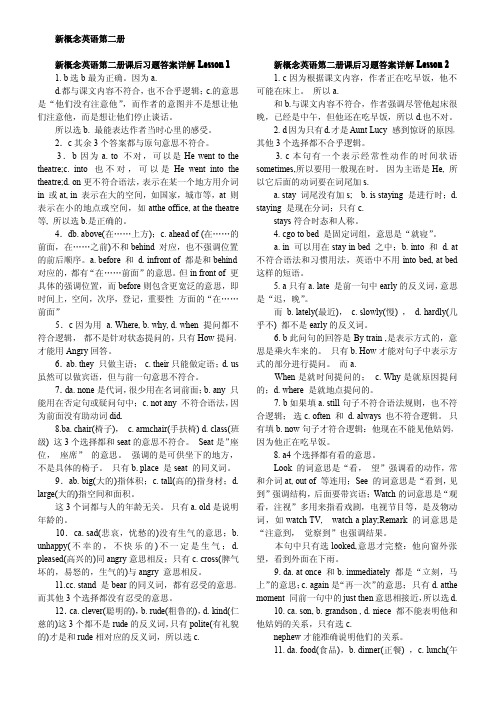
新概念英语第二册新概念英语第二册课后习题答案详解Lesson11.b选b最为正确。
因为a.d.都与课文内容不符合,也不合乎逻辑;c.的意思是“他们没有注意他”,而作者的意图并不是想让他们注意他,而是想让他们停止谈话。
所以选b.最能表达作者当时心里的感受。
2.c其余3个答案都与原句意思不符合。
3.b因为a.to不对,可以是He went to the theatre;c.into也不对,可以是He went into the theatre;d.on更不符合语法,表示在某一个地方用介词in或at,in表示在大的空间,如国家,城市等,at则表示在小的地点或空间,如atthe office,at the theatre 等,所以选b.是正确的。
4.db.above(在……上方);c.ahead of(在……的前面,在……之前)不和behind对应,也不强调位置的前后顺序。
a.before和 d.infront of都是和behind 对应的,都有“在……前面”的意思。
但in front of更具体的强调位置,而before则包含更宽泛的意思,即时间上,空间,次序,登记,重要性方面的“在……前面”5.c因为用 a.Where,b.why,d.when提问都不符合逻辑,都不是针对状态提问的,只有How提问,才能用Angry回答。
6.ab.they只做主语;c.their只能做定语; 虽然可以做宾语,但与前一句意思不符合。
7.da.none是代词,很少用在名词前面;b.any只能用在否定句或疑问句中;c.not any不符合语法,因为前面没有助动词did.8.ba.chair(椅子),c.armchair(手扶椅)d.class(班级)这3个选择都和seat的意思不符合。
Seat是”座位,座席”的意思。
强调的是可供坐下的地方,不是具体的椅子。
只有b.place是seat的同义词。
9.ab.big(大的)指体积;c.tall(高的)指身材;d. large(大的)指空间和面积。
新概念英语第二册第一课课文及翻译

新概念英语第二册第一课课文及翻译(总1页)-本页仅作为预览文档封面,使用时请删除本页-新概念英语第二册第一课课文及翻译【Text】 Last week I went to the theatre. I had a very good seat. The play was very interesting. I did not enjoy it. A young man and a young woman were sitting behind me. They were talking loudly. I got very angry. I could not hear the actors. I turned round. I looked at the man and the woman angrily. They did not pay any attention. In the end, I could not bear it. I turned round again. "I can't hear a word!" I said angrily. "It's none of your business," the young man said rudely. "This is a private conversation!"参考译文:上星期我去看戏. 我的座位很好, 戏很有意思, 但我却无法欣赏. 一青年男子与一青年女子坐在我的身后, 大声地说着话. 我非常生气, 因为我听不见演员在说什么. 我回过头去怒视着那一男一女, 他们却毫不理会. 最后, 我忍不住了, 又一次回过头去, 生气地说 : “我一个字也听不见了!”“不关你的事, “那男的毫不客气地说, “这是私人间的谈话!”2。
(完整版)新概念英语第二册第一课课文及翻译

新概念英语第二册第一课课文及翻译
【Text】Last week I went to the theatre. I had a very good seat. The play was very interesting. I did not enjoy it. A young man and a young woman were sitting behind me. They were talking loudly. I got very angry.
I could not hear the actors. I turned round. I looked at the man and the woman angrily. They did not pay any attention. In the end, I could not bear it. I turned round again. "I can't hear a word!" I said angrily. "It's none of your business," the young man said rudely. "This is a private conversation!"
参考译文:上星期我去看戏. 我的座位很好, 戏很有意思, 但我却无法欣赏. 一青年男子与一青年女子坐在我的身后, 大声地说着话. 我非常生气, 因为我听不见演员在说什么. 我回过头去怒视着那一男一女, 他们却毫不理会. 最后, 我忍不住了, 又一次回过头去, 生气地说: “我一个字也听不见了!”“不关你的事, “那男的毫不客气地说, “这是私人间的谈话!”。
新概念二第1课 课文及答案
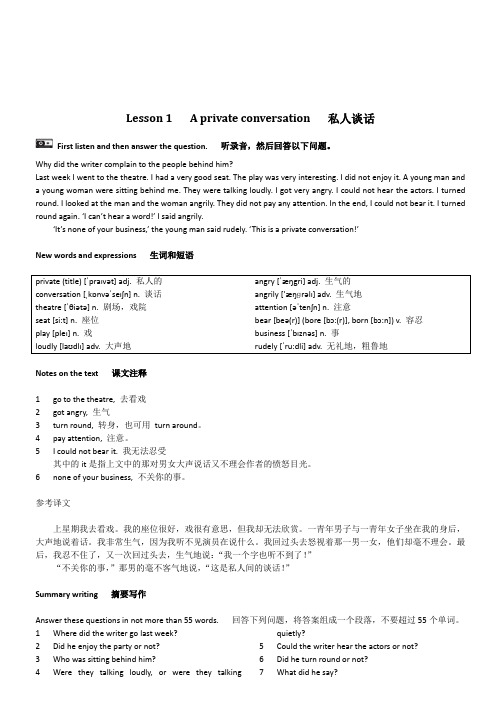
Lesson 1 A private conversation 私人谈话First listen and then answer the question. 听录音,然后回答以下问题。
Why did the writer complain to the people behind him?Last week I went to the theatre. I had a very good seat. The play was very interesting. I did not enjoy it. A young man and a young woman were sitting behind me. They were talking loudly. I got very angry. I could not hear the actors. I turned round. I looked at the man and the woman angrily. They did not pay any attention. In the end, I could not bear it. I turned round again. ‘I can’t hear a word!’ I said angrily.‘It’s none of your business,’ the young man said rudely. ‘This is a private conversation!’New words and expressions 生词和短语Notes on the text 课文注释1 go to the theatre, 去看戏2 got angry, 生气3 turn round, 转身,也可用turn around。
4 pay attention, 注意。
5 I could not bear it. 我无法忍受其中的it是指上文中的那对男女大声说话又不理会作者的愤怒目光。
新概念英语第二册课后练习答案(1-20)
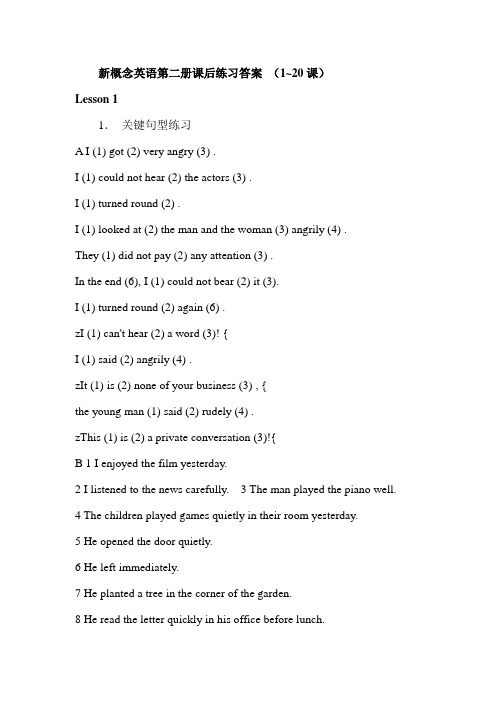
新概念英语第二册课后练习答案(1~20课)Lesson 11.关键句型练习A I (1) got (2) very angry (3) .I (1) could not hear (2) the actors (3) .I (1) turned round (2) .I (1) looked at (2) the man and the woman (3) angrily (4) .They (1) did not pay (2) any attention (3) .In the end (6), I (1) could not bear (2) it (3).I (1) turned round (2) again (6) .zI (1) can't hear (2) a word (3)! {I (1) said (2) angrily (4) .zIt (1) is (2) none of your business (3) , {the young man (1) said (2) rudely (4) .zThis (1) is (2) a private conversation (3)!{B 1 I enjoyed the film yesterday.2 I listened to the news carefully.3 The man played the piano well.4 The children played games quietly in their room yesterday.5 He opened the door quietly.6 He left immediately.7 He planted a tree in the corner of the garden.8 He read the letter quickly in his office before lunch.9 I borrowed a book from the library this morning.10 The cook spoilt the soup.11 We stay at home on Sundays.12 There are a lot of people at the bus stop.13 The little boy ate greedily an apple in the kitchen this morning.14 She draws beautifully.15 I like music very much.16 They built a new school in our village last year.17 The match ended at four o'clock.18 She received a letter from her brother last week.2.多项选择题答案1 b2 c3 b4 d5 c6 a7 d 8 b 9 a 10 c 11 c 12 cLesson 22.难点练习答案1 What a wonderful garden(this is) !2 What a surprise( this is) !3 What a lot of trouble he is causing!4 What wonderful actors (they are) !5 What a hard-working woman (she is) !6 What a tall building (it is) !7 What a terrible film (it is) !8 What a clever boy you are!9 What a pretty girl (she is) !10 What a strange guy (he is) !3.多项选择题答案1 c2 d3 c4 c5 a6 b7 b 8 a 9 d 10 c 11d 12 bLesson 31.关键句型练习题A went (1.1)Õvisited (1.2) Õsat(1.2) Õtaught(1.2)ÕlentÕread(1.3) Õdid notunderstandÕthought (1.4)Õpassed (1.5) Õdid not send(1.5) ÕmadeÕ go up (1.6) Õbought (1.7) Õspent(1.7) Õdid not write(1.8)C ...Roy died last year…left me…spent a lotof money…bought one or two…never went to the cinema…stayed at home…listened tomusic…often lent CDs…they kept them…lost many CDs…2.难点练习题1 He paid some money to the shopkeeper.2 He handed the prize to me.3 The waiter brought the man a bottle ofbeer.4 He sold me all his books.5 The shop assistant found me some curtain material.6 He did a big favour for me.7 She showed her new hat to her husband.8 She promised the finder a reward.9 He gave some advice to his son.10 His uncle left some money to/ for him.11 He is teaching us English.12 I bought you this bunch of flowers.13 Bring me that book please.14 He offered a cigarette to me.15 Read the first paragraph to me.16 I've ordered you some soup.17 I owe a lot of money to him.18 Pass your father the mustard.3.多项选择1c 2a 3c 4a 5d 6b7c 8c 9b 10a 11b 12bLesson 121.关键句型练习答案A will sail (1.1); shall meet (1.2); will be (1.3); will set out (11.4-5); shall have(1.5); shallsee (1.5); shall say (1.6);will be (1.6); will take part (1.7)C I shall go to the theatre Reg and I shall see the firstperformance the producer will give a short speech. He will speak to The play will bevery people will enjoy it very much.2.难点练习答案1 He is not back yet. He will be back in ten minutes.2 A new play is on at the Globe Theatre.3 When the concert was over, We went home.4 They will set out/ off very early tomorrow morning. (Here be off is also possible.)5 You can't take the exam yet. You are not up to it.6 He will be away from home for two months.7 She swam across the English Channel and set up a new world record. 3.多项选择题答案1 c2 c3 a4 d5 d6 a7 d 8 a 9 c 10 d 11 a 12 aLesson 131.关键句型练习答案A will be arriving (1.2); will be coming (1.3); will be meeting (1.4); will be singing (1.5);will be staying (1.6); will be trying (1.8)C 1 I'll be ironing the clothes.2 The train will be arriving in a few minutes.3 We'll be seeing you in the morning.4 We'll be watching the match.5 He'll be correcting exercise books.2.难点练习答案1 It's George's.2 It's Jean's.3 It's that woman's.4 I like Keats' poetry best.5 They're the children's.6 They're the soldiers'.7 I'll leave in six hours time. 8 There was a hundred pounds' worth of damage.3多线选择答案1 b2 d3 b4 c5 a6 b7 b 8 c 9 a 10 a 11a 12 dLesson 141.关键句型练习答案A 1 I drove on to the next town after I had left a small village.2 I said good morning to him in French as soon as he had got into the car.3 I had nearly reached the town, when the young man said:BDo you speak English?C 1 After she had written the letter, she went to the post office.2 After he had had dinner, he went to the cinema.3 When I had fastened my seat belt, the plane took off.4 We did not disturb him until he had finished work.5 As soon as he had left the room, I turned on the radio.6 He had been very ill before he died.D 1 regretted 2 had begun/ began 3 arrived2.难点练习答案1 Except for2 both of3 Apart from4 askedlask for5 neither oflasked3.多项选择答案1 b2 c3 a4 c5 d6 b7 c 8 b 9 c 10 b 11 b 12 bLesson 151. 关键句型练习答案A 1a The secretary told me that Mr. Harmsworth would see me.bcMr. Harmsworth will see you. d2 a Mr. Harmsworth said that business was very bad.b cBusiness is very bad.d3 a Mr. Harmsworth told me that the firm could not afford to pay such large salaries.b cThe firm cannot afford to pay such large salaries. dB 1 told would come/would be coming2 said (had) cut3 told had never played4 did he say had done/would do5 did he tell (had) bought/would buy6 said could not7 said (had) worked8 told wrote/writes/had never written9 did you say were/had been10 said would wait2.难点练习答案1 study2 office3 nervous4 afford5 irritable3.多线选择答案1d 2b 3c 4b 5c 6d7a 8d 9c 10c 11c 12bLesson 201关键句型练习答案A Fishing(1.1); catching(11.1-2); catching(1. 3); having spent(1.5); fishing(1.6);fishingˆ sitting(1.8); doing (1.9) C 1 he went out of the restaurant without paying the bill.2 She bought a pair of boots instead of getting a pair of shoes.3 She was afraid of spending the night alone.4 After hearing/having heard the news, she fainted.5 Think carefully before answering my question.6 On seeing the plane coming towards me, I dashed for cover.2难点练习答案1realized 2It'sˆunderstandˆits 3exciting 4interesting 5excit ing 6interested3多项选择答案1b 2c 3b 4b 5c 6b新概念英语第二册课后习题答案详解Lesson 21练习答案 Key to written exercises 1.关键句型练习答案A …passing planes can be heard(1.2); The airport was built (1.2); it could not be used then(1. 3); a hun dred people must have been driven away(11.4-5); this house will be knocked down by a passing pl ane(11.6-7); I have been offered a large sum of money(1.7)C 1 A message will be sent immediately. 2 All these goods must be sold.3 I told you the parcel would be received in time.4 The letter has to be delivered by hand.5 Your l etter must have been lost In the post. 2.难点练习答案 A (sample answers)The dog drove the sheep out of the field. The police drove the crowds back. I drove my car into th e garage. B1 home 2 houses 3 house 4 home 3.多项选择题答案1. c根据课文第3-4行Last year, however, it came into use, 只有c. came into use recently 比较接近课文的实际内容,而其他3个选择都不符课文内容。
新概念英语第二册lesson1-lesson5最全课后答案详解。

新概念英语第二册lesson1-lesson5最全课后答案详解。
(呕心沥血之作)Lesson1摘要写作参考答案(Key to Summary writing) Unit 1Lesson 1 A Private ConversationThe writer went to the theatre last week.He did't enjoy the play.A young man and a young woman were sitting behind him.They were talking loudly.The writer couldn't hear the actors.He turned round.He said he couldn't hear a word.The young man said ,'This is a private conversation!'.(53 words)关键句型练习B1 I enjoyed the film yesterday2 I listened to the news carefully.3 The man played the piano well.4 The children played games quietly in their room yesterday.5 He opened the door quietly.6 He left immediately.7He planted a tree in the corner of the garden.8He read the letter quickly in his office before lunch9 I borrowed a book from the library this morning.10the cook spoilt the soup.11 We stay at home on Sundays.12 There are a lot of people at the bus stop.13 The little boy ate greedily an apple in the kitchen this morning.14 She draws beautifully.15 I like music very much.16 They built a new school in our village last year.17 The match ended at four o'clock.18 She received a letter from her brother last week.多项选择题1. b选b最为正确。
新概念英语第二册第一课课文及翻译
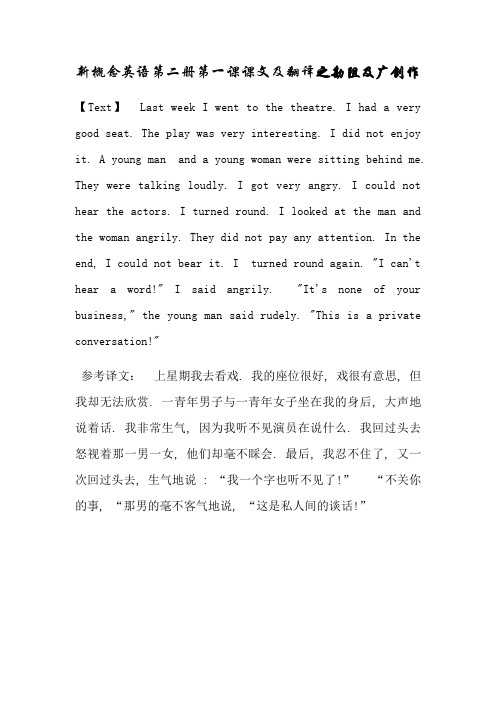
新概念英语第二册第一课课文及翻译之勘阻及广创作【Text】 Last week I went to the theatre. I had a very good seat. The play was very interesting. I did not enjoy it. A young man and a young woman were sitting behind me. They were talking loudly. I got very angry. I could not hear the actors. I turned round. I looked at the man and the woman angrily. They did not pay any attention. In the end, I could not bear it. I turned round again. "I can't hear a word!" I said angrily. "It's none of your business," the young man said rudely. "This is a private conversation!"
参考译文:上星期我去看戏. 我的座位很好, 戏很有意思, 但我却无法欣赏. 一青年男子与一青年女子坐在我的身后, 大声地说着话. 我非常生气, 因为我听不见演员在说什么. 我回过头去怒视着那一男一女, 他们却毫不睬会. 最后, 我忍不住了, 又一次回过头去, 生气地说: “我一个字也听不见了!” “不关你的事, “那男的毫不客气地说, “这是私人间的谈话!”。
新概念英语第二册Lesson01Aprivateconversation私人谈话讲义

新概念英语第二册Lesson 01A private conversation私人谈话A private conversationLast week I went to the theatre. I had a very good seat. The play was very interesting.I did not enjoy it. A young man and a young woman were sitting behind me. They were talking loudly. I got very angry. I could not hear the actors. I turned round. I looked at the man and the woman angrily. They did not pay any attention. In the end, I could not bear it.I turned round again. I cant hear a word! I said angrily.Its none of your business, the young man said rudely. This is a private conversation!【课文翻译】私人谈话Last week I went to the theatre.上星期我去看戏。
I had a very good seat. The play was very interesting. I did not enjoy it.我的座位很好,戏很有意思,但我却无法欣赏。
A young man and a young woman were sitting behind me. They were talking loudly.一青年男子与一青年女子坐在我的身后,大声地说着话。
新概念英语(二)答案与解析
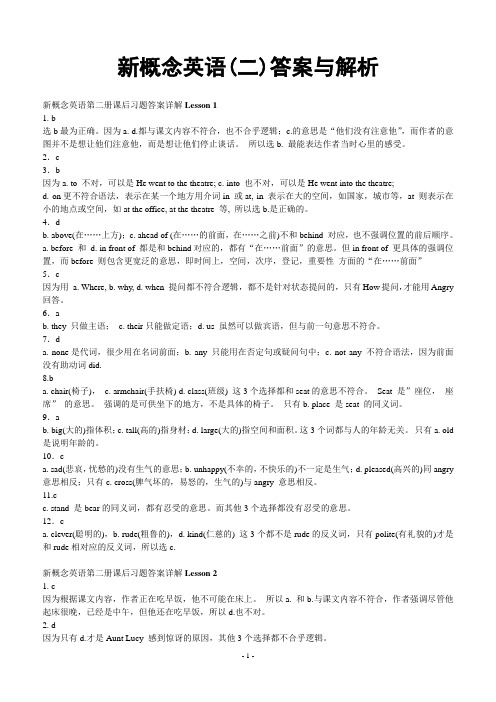
新概念英语(二)答案与解析新概念英语第二册课后习题答案详解Lesson 11. b选b最为正确。
因为a. d.都与课文内容不符合,也不合乎逻辑;c.的意思是“他们没有注意他”,而作者的意图并不是想让他们注意他,而是想让他们停止谈话。
所以选b. 最能表达作者当时心里的感受。
2.c3.b因为a. to 不对,可以是He went to the theatre; c. into 也不对,可以是He went into the theatre;d. on更不符合语法,表示在某一个地方用介词in 或at, in 表示在大的空间,如国家,城市等,at 则表示在小的地点或空间,如at the office, at the theatre 等, 所以选b.是正确的。
4.db. above(在……上方);c. ahead of (在……的前面,在……之前)不和behind 对应,也不强调位置的前后顺序。
a. before 和d. in front of 都是和behind对应的,都有“在……前面”的意思。
但in front of 更具体的强调位置,而before 则包含更宽泛的意思,即时间上,空间,次序,登记,重要性方面的“在……前面”5.c因为用 a. Where, b. why, d. when 提问都不符合逻辑,都不是针对状态提问的,只有How提问,才能用Angry 回答。
6.ab. they 只做主语;c. their只能做定语;d. us 虽然可以做宾语,但与前一句意思不符合。
7.da. none是代词,很少用在名词前面;b. any 只能用在否定句或疑问句中;c. not any 不符合语法,因为前面没有助动词did.8.ba. chair(椅子),c. armchair(手扶椅) d. class(班级) 这3个选择都和seat的意思不符合。
Seat 是”座位,座席”的意思。
强调的是可供坐下的地方,不是具体的椅子。
新概念英语第二册第一课(包含课文、练习及答案)
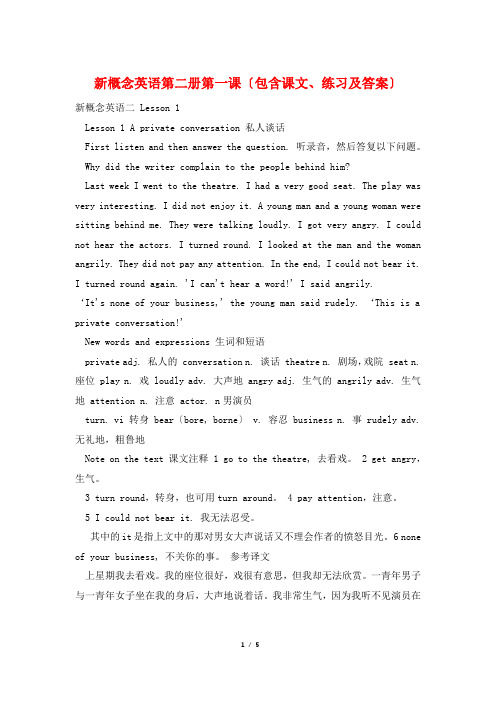
新概念英语第二册第一课〔包含课文、练习及答案〕新概念英语二 Lesson 1Lesson 1 A private conversation 私人谈话First listen and then answer the question. 听录音,然后答复以下问题。
Why did the writer complain to the people behind him?Last week I went to the theatre. I had a very good seat. The play was very interesting. I did not enjoy it. A young man and a young woman were sitting behind me. They were talking loudly. I got very angry. I could not hear the actors. I turned round. I looked at the man and the woman angrily. They did not pay any attention. In the end, I could not bear it.I turned round again. 'I can't hear a word!' I said angrily.‘It's none of your business,' the young man said rudely. ‘This is a private conversation!'New words and expressions 生词和短语private adj. 私人的 conversation n. 谈话 theatre n. 剧场,戏院 seat n. 座位 play n. 戏 loudly adv. 大声地 angry adj. 生气的 angrily adv. 生气地 attention n. 注意 actor. n男演员turn. vi 转身 bear〔bore, borne〕 v. 容忍 business n. 事 rudely adv. 无礼地,粗鲁地Note on the text 课文注释 1 go to the theatre, 去看戏。
- 1、下载文档前请自行甄别文档内容的完整性,平台不提供额外的编辑、内容补充、找答案等附加服务。
- 2、"仅部分预览"的文档,不可在线预览部分如存在完整性等问题,可反馈申请退款(可完整预览的文档不适用该条件!)。
- 3、如文档侵犯您的权益,请联系客服反馈,我们会尽快为您处理(人工客服工作时间:9:00-18:30)。
Lesson 1 A private conversation 私人谈话First listen and then answer the question. 听录音,然后回答以下问题。
Why did the writer complain to the people behind him?Last week I went to the theatre. I had a very good seat. The play was very interesting. I did not enjoy it. A young man and a young woman were sitting behind me. They were talking loudly. I got very angry. I could not hear the actors. I turned round. I looked at the man and the woman angrily. They did not pay any attention. In the end, I could not bear it. I turned round again. ‘I can’t hear a word!’ I said angrily.‘It’s none of your business,’ the young man said rudely. ‘This is a private conversation!’New words and expressions 生词和短语Notes on the text 课文注释1go to the theatre, 去看戏2got angry, 生气3turn round, 转身,也可用turn around。
4pay attention, 注意。
5I could not bear it. 我无法忍受其中的it是指上文中的那对男女大声说话又不理会作者的愤怒目光。
6none of your business, 不关你的事。
参考译文上星期我去看戏。
我的座位很好,戏很有意思,但我却无法欣赏。
一青年男子与一青年女子坐在我的身后,大声地说着话。
我非常生气,因为我听不见演员在说什么。
我回过头去怒视着那一男一女,他们却毫不理会。
最后,我忍不住了,又一次回过头去,生气地说:“我一个字也听不到了!”“不关你的事,”那男的毫不客气地说,“这是私人间的谈话!”Summary writing 摘要写作Answer these questions in not more than 55 words. 回答下列问题,将答案组成一个段落,不要超过55个单词。
1Where did the writer go last week?2Did he enjoy the party or not?3Who was sitting behind him?4Were they talking loudly, or were they talking quietly?5Could the writer hear the actors or not?6Did he turn round or not?7What did he say?8Did the young man say, ‘The play is not interesting,’ or did he say, ‘This is a private conversation!’?摘要写作参考:The writer went to the theatre last week. He did not enjoy the party. A young man and a young woman were sittingbehind him. They were talking loudly. The writer could not hear the actors. He turned round. ‘I can’t hear a word!’ He said. ‘This is a private conversation!’ the young man said.(55 words)Key structures 关键句型Word order in simple statements 简单陈述句的语序a A statement tells us about something. All the sentences in the passage are statements. Each of these statementscontains one idea. Each statement tells us about one thing. A statement that tells us about one thing is a simple statement.陈述句用来叙述一件事情。
本段课文中的所有句子都是陈述句。
每个句子包含着一个概念,告诉我们一件事情。
凡是叙述一件事情的陈述句都是简单陈述句。
b The order of the words in a statement is very important. Look at these two statements. They both contain the wordsbut they do not mean the same thing:陈述句的语序很重要,注意下面两个句子,每句话所用的单词相同,但句子所表达的意思不同:The policeman arrested the thief. 警察逮捕了小偷。
The thief arrested the policeman. 小偷逮捕了警察。
c A simple statement can have six parts, but it does not always have so many. Study the order of the words in thefollowing columns. Note that column 6 (When?) can be at the beginning or at the end of a statement.一个简单陈述句可以由6部分组成,但是并不是每个句子都有这么多组成部分。
注意下表中句子的语序。
第6栏(表示时间)可以放在句首或句尾。
Exercises 练习A Rule seven columns on a double sheet of paper. At the top of each column, write the numbers and the words givenin the Table below. Copy out the rest of the passage. Put the words of each statement in the correct column in the way shown in the Table.在一张大纸上画出7栏,在前两行相应的栏内填入下表中第1、2行的数字和关键词,将课文中其他句子也注释:本课的关键句型是简单陈述句。
陈述句是用来叙述一件事情的句子。
每个句子包含一个概念,告诉我们一件事情。
一个简单陈述句可以由6部分组成,但是并不是每个句子都有那么多部分。
这6部分的顺序应该是:主语/动词/宾语或补语/方式状语/地点状语/时间状语(Subject/Verb/Object or Complement/Manner/Place/Time)。
时间状语可以放在句尾,也可以放在句首:The children played games quietly in their room yesterday.主/动/宾/方式/地点/时间Last week I went to the theatre.时间/主/动/地点B Use the seven columns again for this exercise. There is a line under each word or group of words in the statementsbelow. The words are not in the right order. Arrange them correctly in the seven columns. Look at this example:I last year to America went.The correct order is: I (who) went (action) to America (where) last year (when).Or: Last year I went to America.1The film I enjoyed yesterday.I enjoyed the film yesterday.2The news listened to I carefully.I listened to the news carefully.3Well the man the piano played.The man played the piano well.4Games played yesterday in their room the children quietly.The children played games quietly in their room yesterday.5Quietly the door he opened.He opened the door quietly.6Immediately left he.He left immediately.7 A tree in the corner of the garden he planted.He planted a tree in the corner of the garden.8Before lunch the letter in his office quickly he read.He read the letter quickly in his office before lunch.9This morning a book I from the library borrowed.I borrowed a book from the library this morning.10The soup spoilt the cook.The cook spoilt the soup.11We at home stay on Sunday.We stay at home on Sundays.12There a lot of people are at the bus stop.There are a lot of people at the bus stop.13The little boy an apple this morning ate greedily in the kitchen.The little boy ate greedily an apple in the kitchen this morning.14She beautiful draws.She draws beautiful.15Music I like very much.I like music very much.16 A new school built they in our village last year.They built a new school in our village last year.17The match at four o’clock ended.The match ended at four o’clock.18She a letter from her brother last week received.She received a letter from her brother last week.Multiple choice questions 多项选择题Comprehension 理解1The writer turned round. He looked at the man and the woman angrily _____.(a) and they stopped talking(b) but they didn’t stop talking(c) but they didn’t notice him(d) but they looked at him rudely解析:选(b)最为正确。
